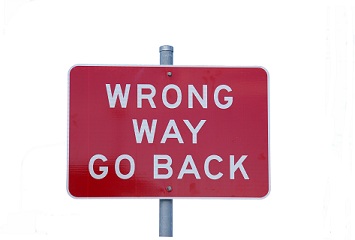
When you become the best sales negotiator in the world you’ll be right all the time. However, since you’re not there yet, you should expect to be wrong – not all the time, but at least some of the time. There are a lot of different ways to handle this, what’s the right way?
Why You’ll Be Wrong
Wait a minute, if you are a good negotiator then why would you still be making mistakes? I mean, if you take the time to prepare for the negotiation, understand the other side of the table and what they are hoping to get out of the negotiation, and are up on your negotiating tactics, then there’s no way that you can end up making mistakes, right?
Wrong. At the end of the day we’re all human and that means that we’re going to end up making mistakes. Negotiations are high-pressure communication sessions in which a great deal of information can flow back and forth over the table in a very short time. Your position and the other side’s position can change in a heartbeat and keeping up with it all can be too much for even the best of us.
At any point in time during a negotiation you may find that you’ve made a concession that you should not have. Or perhaps you’ll discover that some of the information that you presented in order to support one of your points was flawed in some way that the other side was able to point out to you. No matter the cause, the end result is the same – you find yourself being wrong.
What You Can Do When You Are Wrong
Unless you’ve successfully built yourself a time machine that you can step into whenever something like this happens, once you’re wrong, you’re wrong. This means that you’re going to have to either ignore it or take some action.
The incorrect thing to do, in most cases, is to ignore it. If you’ve given something away, made a concession that you should not have, or if you’ve said something that you wish that you could take back, then you need to undo it. This means that you tell the other side that you’ve made a mistake. You own up to your error.
A negotiation is not like carving a stone – you can undo things that have already been done. What’s even better is that you have options: you can undo things or you can ask the other side of the table to help you undo it.
No matter what, a deal requires both sides to come to agreement. If you are not happy about something that you’ve done, than this is not going to happen. Therefore, if you need to change something that has already been done just go ahead and do it. Yes, the other side is not going to be happy about this because it is going to delay the negotiations, but that’s ok. Speaking up and correcting an error is how you are going to be able to reach an agreement that you’ll feel comfortable living with.
What All Of This Means For You
Nobody is perfect and negotiators are no different than everyone else. This means that we’re going to be wrong some of the time. It’s what we do when we discover that we’re wrong that separates the adequate negotiators from the great ones.
The reason that we make mistakes during a negotiation are many and varied. It’s a high-pressure, fast moving environment and so the possibility that we’ll do or say something that we don’t mean to is very real. When we make a mistake, the best thing for us to do is to speak up. Tell the other side that you you’ve done or said something that you didn’t mean and “take it back”. A negotiation is not set in stone, you can hit rewind at any time. The other side might not be pleased, but you will feel much better for doing it.
As with all such things in life, being wrong during a sales negotiation is going to happen to all of us at probably more times than we care to admit. Realizing that it has happened is the first step to fixing the situation. Having the courage to correct it is the key to ending up with a successful deal in the end.
– Dr. Jim Anderson
Blue Elephant Consulting –
Your Source For Real World Negotiating Skills™
Question For You: If you say something that you shouldn’t have, do you think that you should ever call attention to it later on?
![]() Click here to get automatic updates when The Accidental Negotiator Blog is updated.
Click here to get automatic updates when The Accidental Negotiator Blog is updated.
P.S.: Free subscriptions to The Accidental Negotiator Newsletter are now available. Learn what you need to know to do the job. Subscribe now: Click Here!
What We’ll Be Talking About Next Time
I hate to negotiate with people who don’t know how to negotiate. Knowing this you might think that I’m always expecting the other side to be on top of things, know what they want and have a plan on how they are going to get there. It turns out that you’d be wrong – sometimes not being able to make up your mind is more powerful than knowing where you are going.
